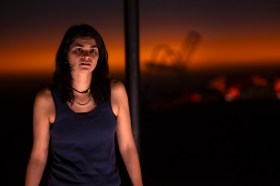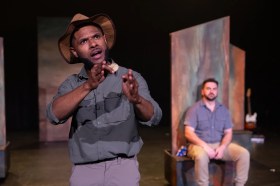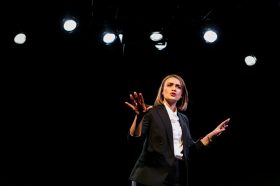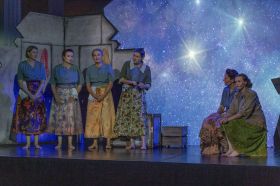Musically, Verdi here reveals the culmination of a lifetime’s experience. The flowing melodies and grand arias of his tragic operas give way to subtle characterisation through rhythm, harmony and counterpoint: solid marching rhythms for the staid businessmen of Windsor, jokey galloping ones for their far-from-staid womenfolk. Verdi’s skilful use of counterpoint, gradually introduced to us through the women’s quartet work, comes to a roaring climax in the final scene with the magnificent fugal schemata of ‘All the World’s a Joke’. It is really only in this scene that we hear the WA Opera’s chorus at its finest, the rest of the work being dominated by the soloists. And what soloists they are!
Following his success in Tales of Hoffmann earlier this year, James Clayton gave us, in his depiction of Falstaff, another serving of his enviable talent. He not only did the role proud with his versatile baritone voice; he also gave us an exquisite portrayal of a middle-aged man trying to recapture his youth through sexual adventures. His slapstick scenes with his crazy off-siders, Bardolph (Gerard Schneider) and Pistol (Ryan Sharp), were at times screamingly funny, while his terror at the end, when he believes himself beset by other-worldly beings, was quite pitiable. We dislike the behaviour and despise his philosophy, but love the man, just as centuries of Shakespearean audiences have done.
The four women, Alice Ford (Elisa Wilson), her daughter Nanetta (Katja Webb), her friend Meg Page (Sarah-Janet Brittenden) and Mistress Quickly (Sally-Anne Russell), their go-between with Falstaff, formed a cohort of boundless energy in both singing and characterisation, providing a perfect foil to their more stolid male counterparts. Four flawless voices backed up by excellent acting – what more can one say? I will however, make special mention of Katja Webb’s lengthy solo in the penultimate scene, sustained with faultless control and fine diction.
Overall, though, this scene did not work for me. The idea of having the chorus on their knees in an effort to look like elves might have worked if someone had thought to add trains to their gowns to cover their feet, which tended to show as they shuffled around like a mob of late-night revellers looking for lost car keys. Fortunately their lovely singing compensated for my failure to suspend disbelief in their faery credentials, and poor Falstaff, prone at the front of the stage, was too frightened to look.
Of the male soloists, Sitiveni Talei as Ford carried a difficult role with aplomb. Through his heartbroken, angry solo in Act II, Talei showed us a man more ashamed at the prospect of being cuckolded than saddened by the thought of losing his wife’s affection. In cahoots with Ford, the physically impressive Bernard Hull as Dr Caius provided a fine foil for Sam Sakker as Fenton, his rival for the hand of the fair Nannetta. The young lovers shared a charming duet in Act II and had some cheerfully flirtatious scenes that at times ordered on slapstick. One cannot imagine the dignified Dr Caius ever indulging in such shenanigans.
The technical aspects of the production are no less noteworthy than the singing and acting. Ian Aitken’s clever revolving set was enhanced by Nick Shlieper’s lighting design and complemented by Tracy Grant Lord’s lovely period costumes. I must admit I would have preferred fewer costume changes: the extravagance of new kit for every scene, to say nothing of the strain on the performers, seemed unnecessary. This is a difficult enough piece without extra costume changes. Without even looking at the singing and the sheer physicality of the production, there were long minutes during which the chorus was required to stand stock-still, some of them holding strenuous poses. No wonder they are only singing Falstaff five times over ten days!
The WASO, by the way, appears to have found a treasure in conductor Simon Hewitt. He drove the orchestra through the demanding score like Garth Tander powering down Conrod Straight at this year’s Bathurst 1000. Well done Hewitt, well done WASO, well done WA Opera!
Rating: Four and a half stars
The West Australian Opera presents
Falstaff by Guiseppe Verdi
Original Director: Simon Phillips
Revival Director: Julie Edwardson
Costume Designer: Tracy Grant
Scenic Designer: Iain Aitken
Lighting Designer: Nick Schlieper
Cast: James Clayton, Sitiveni Talei, Elisa Wilson, Katja Webb, Sarah-Janet Brittenden, Sally-Anne Russell, Sam Sakker, Bernard Hull, Gerard Schneider and Ryan Sharp
West Australian Symphony Orchestra
Conductor: Simon Hewett
Concert Master: Giulio Plotino
His Majesty’s Theatre, Perth
November 3, 5, 8, 10 & 12






